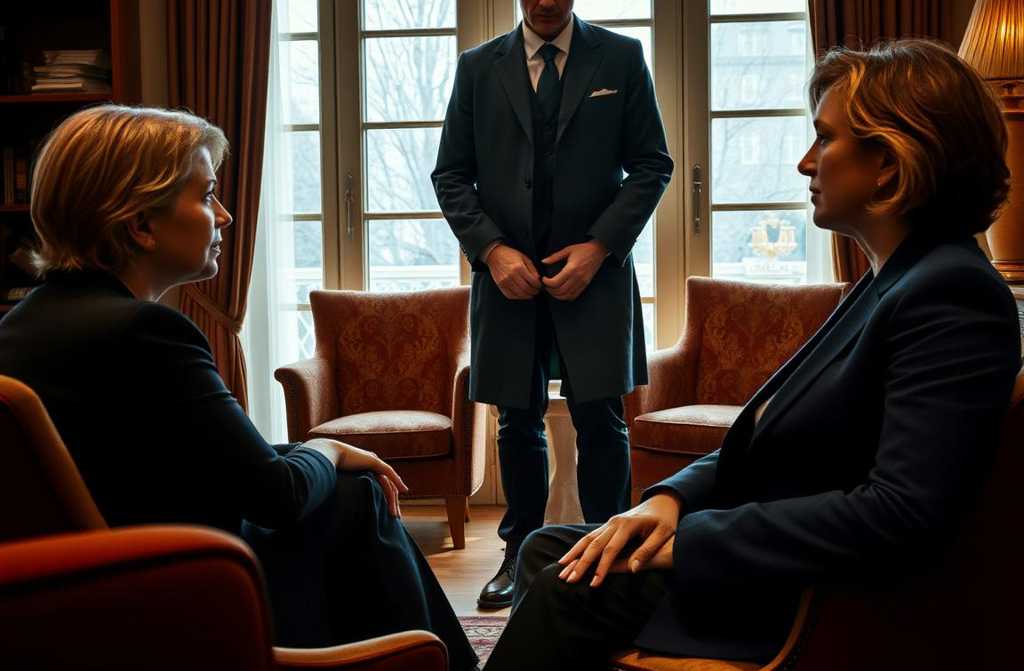My son brought a psychiatrist home to have me declared incompetent, but he didnt know the doctor was my ex-husbandand his father.
“Mum, open up. Its me. And Im not alone.”
Olivers voice at the door was unusually firm, almost formal. I set my book aside and walked to the hallway, smoothing my hair as I went. A knot of unease twisted in my stomach.
There he stood on the threshold, and behind hima tall man in a tailored coat. The stranger carried an expensive leather briefcase and studied me with calm, assessing eyes. The kind of look reserved for objects to be either purchased or discarded.
“May we come in?” Oliver asked, not bothering to smile.
He stepped inside like he already owned the placewhich, perhaps, he believed he did. The stranger followed.
“This is Dr. Edward Whitmore,” Oliver said, shrugging off his jacket. “Hes a psychiatrist. We just want to talk. Im worried about you.”
The word *worried* sounded like a verdict. I glanced at this *Edward Whitmore*. Silver at his temples, thin lips pressed tight, tired eyes behind stylish glasses. And something achingly familiar in the way he tilted his head slightly, watching me.
My heart lurched.
Edward.
Forty years had softened his features, weathered him with time and a life I didnt share. But it was him.
The man Id once loved to madnessand cast out with equal fury. Olivers father, who never knew he had a son.
“Good afternoon, Mrs. Bennett,” he said in the smooth, measured tone of a professional. Not a flicker of recognition in his eyes. Either he didnt remember, or he was pretending not to.
I nodded silently, my legs going numb. The world narrowed to one point: his composed, clinical face.
My son had brought a man home to have me committed and take my flatand that man was his own father.
“Lets go to the sitting room,” I said, my voice eerily steady. Even I barely recognized it.
Oliver launched into his rehearsed speech while the *doctor* surveyed the room. He spoke of my “unhealthy attachment to possessions,” my “refusal to accept reality,” how difficult it must be for me alone in such a large flat.
“Emily and I want to help,” he said. “Well buy you a cosy studio near us. Youll be looked after. The rest of the money will keep you comfortable.”
He spoke of me as if I werent there. As if I were an old wardrobe to be moved out of sight.
Dr. Whitmore*Edward*listened, nodding occasionally. Then he turned to me.
“Mrs. Bennett, do you often speak to your late husband?” His question hit like a punch to the gut.
Oliver looked away. So, hed told him. My habit of murmuring to my late husbands photo had become a symptom in his hands.
I shifted my gaze from my sons guilty face to Edwards impassive one. Cold fury replaced the shock.
They both waited for an answer. One with greedy impatience, the other with clinical curiosity.
Well, if they wanted a game, theyd get one.
“Yes,” I said, staring straight at Edward. “I do. Sometimes he even answers. Especially when the subject is betrayal.”
Not a muscle moved in Edwards face. He simply jotted a note.
The gesture spoke louder than words. *Patient exhibits aggression, confirms defensive reaction. Projection of guilt.* I could almost see the line in his neat doctors script.
“Mum, why would you say that?” Oliver fidgeted. “Dr. Whitmores here to help, and youre just being difficult.”
“Help with what, Oliver? Help free up space for you?”
Two warring emotions battled in me: scalding hurt and the urge to shake him, scream, *Wake up! Look who youve brought here!* But I stayed silent. Showing my hand now meant losing.
“Thats not true,” he flushed, the redness the only proof he still had a conscience. “Emily and I are concerned. Youre all alone here, buried in your memories.”
Edward raised a hand, gently stopping him.
“Oliver, allow me. Mrs. Bennett, what do you consider betrayal? Its an important feeling. Lets discuss it.”
His studying gaze never left me. I decided to test him.
“Betrayal comes in many forms, Doctor. Sometimes a man leaves for work and never returns. Sometimes he comes back years later to take the last thing you have.”
I watched for his reaction. Nothing. Only mild professional interest.
Either his control was ironclad, or he truly didnt remember. The latter was more terrifying.
“An interesting metaphor,” he noted. “So you perceive your sons concern as an attempt to take something from you? How long have you felt this way?”
He was interrogating me. Methodically, carefully, steering me toward his predetermined diagnosis. Every word, every gesture would be twisted to fit.
“Oliver,” I ignored Edward, “take the doctor outside. We need to speak alone.”
“No,” he snapped. “Well discuss this together. I wont let you manipulate me with guilt. Dr. Whitmore is an impartial expert.”
*Impartial expert.* My ex-husband, whod never paid child support because he never knew he had a child.
The father Oliver had never met. The irony was so cruel I nearly laughed aloud. But I held back. Theyd mark that as a symptom too.
“Fine,” I said, feigning submission. Something inside me hardened into ice. “Since youre so eager to help tell me your plan.”
Oliver brightened, mistaking my calm for surrender.
He gushed about a studio in a new-build on the outskirts, a concierge, “other nice elderly ladies” on benches. I listened and watched Edward. And suddenly, I understood.
He didnt just fail to recognize me. He looked at me with the same dismissiveness hed once reserved for everything beneath him: my love of simple things, my paperbacks, my “provincial” sentimentality.
Hed run from it forty years ago. Now fate had brought him back to deliver the final verdictto label me *unwell* and remove me from sight.
“Ill consider your offer,” I said, rising. “Now, please leave. I need to rest.”
Oliver beamed. Hed won. Id *agreed to think.*
“Of course, Mum. Rest. Ill call tomorrow.”
They left. Edward threw me one last glancenothing but professional satisfaction.
I locked the door behind them, watched from the window as they walked to his expensive car. Father and son. How touching.
Theyd already mentally divided my home. But theyd overlooked one thing.
I wasnt just a sentimental old woman. I was a woman whod been betrayed once. I wouldnt allow it twice.
The next morning, Oliver called at ten sharp, chirpy and businesslike.
“Mum, how are you? Rested? Dr. Whitmore suggested a formal assessment. With tests. He can come by tomorrow.”
I stayed silent, fingers tracing my grandmothers silver spoon.
“Mum? Its just procedure. Emilys already picked out olive curtains for the lounge.”
*Click.*
Not a sounda sensation. Something inside me snapped.
*Curtains.* They were choosing curtains for *my* flat. My home. I wasnt even gone yet, and they were dividing my life.
“Fine,” I said coldly. “Let him come.”
I hung up before he could celebrate. Enough. Enough being understanding, weak, convenient. Enough playing the victim in their scheme. Time to start mine.
First, I opened my laptop. *Psychiatrist Dr. Edward Whitmore.*
The internet knew everything. There he wasmy Edward. Successful doctor, owner of *Harmony Mind Clinic*, published author, TV expert.
In photos, he smiled with polished confidence.
I called the clinic, booked an appointment under my maiden nameAnna Hart. The receptionist cheerfully offered a morning slot. How convenient.
That evening, I sifted through old boxes. Not for prooffor myself.
The twenty-year-old girl hed left pregnant because she “didnt match his ambitions.” The one whod survived, raised a son alone, given him everything.
And now that son had brought his *successful* father back to dispose of his *problem* mother.
The next morning, I dressed differently. A tailored suit I hadnt worn in years. Styled hair, understated makeup. The mirror showed not a frightened woman but a general before battle.
*Harmony Mind Clinic* smelled of expensive perfume and sterility. His office was vastpanoramic windows, leather furniture.
Edward sat behind a dark oak desk. He looked up as I entered, surprise flickering across his face.
He hadnt expected *Mrs. Bennett* here. Not yet.
“Good morning,” he gestured to the chair. “Anna Hart? How can I help?”
I sat, purse on my lap.







